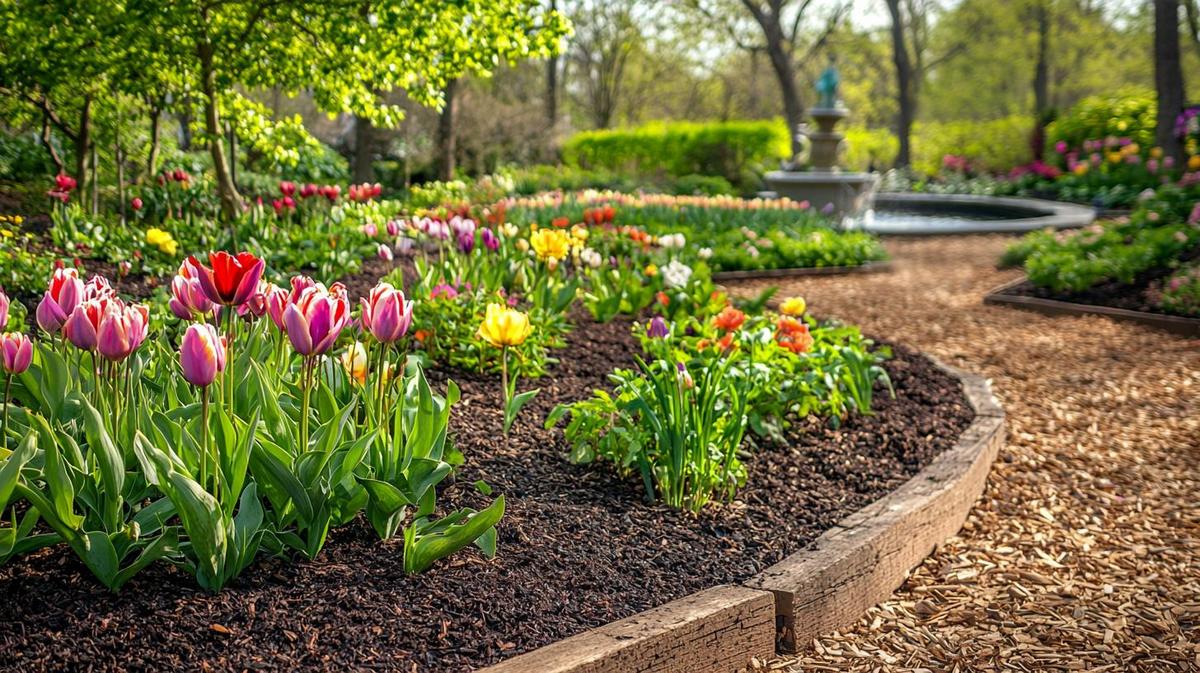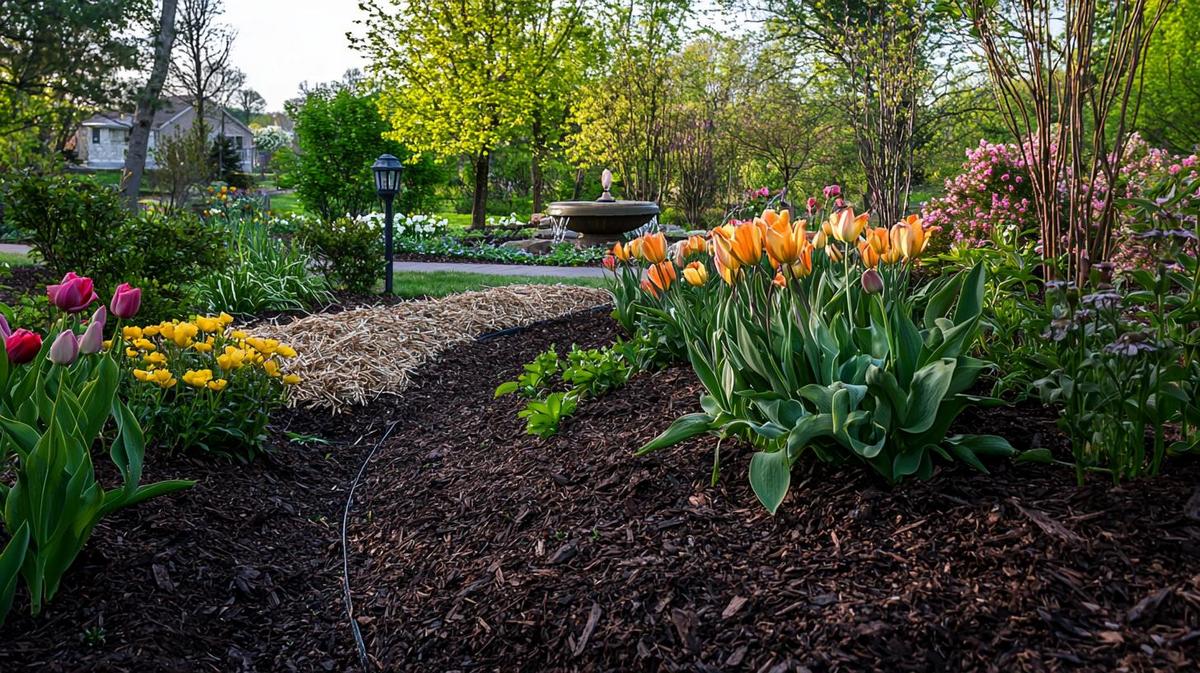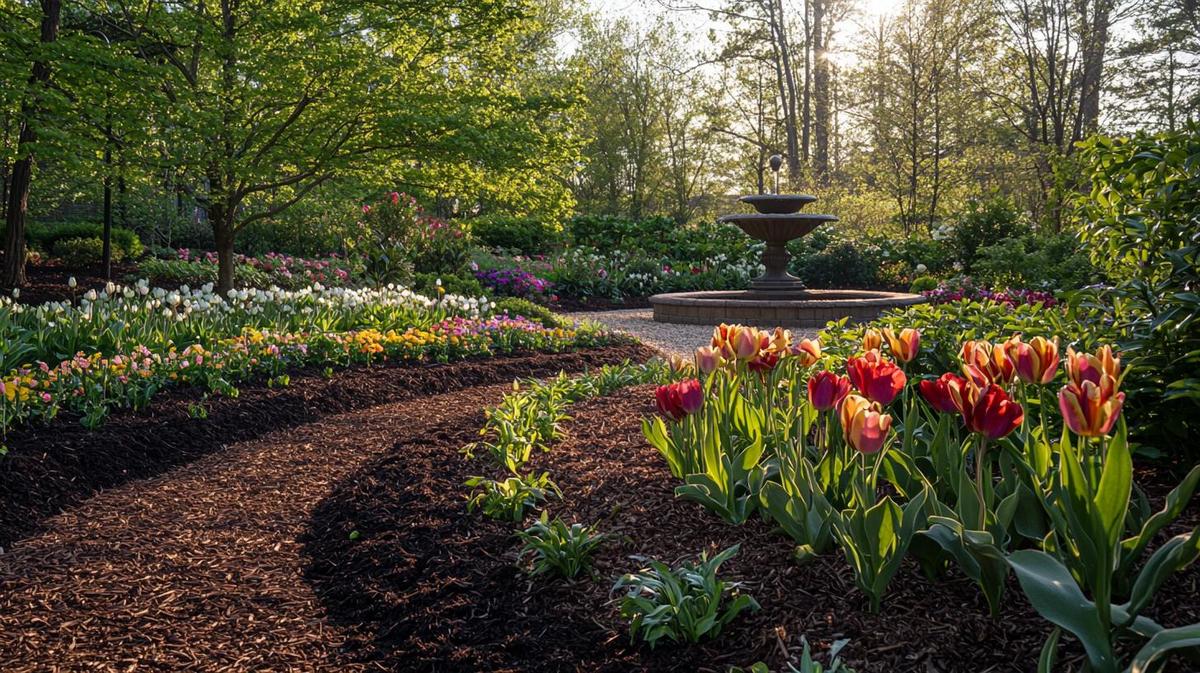- Mulch supports soil health by providing habitat and nutrients for microorganisms.
- It enhances fertility and moisture retention, and improves soil structure.
- Mulch reduces soil erosion and encourages root growth by keeping the surface loose.
- Cedar mulch retains moisture, suppresses weeds, and has natural insect-repelling oils.
- Mulch can prevent weed growth; black plastic, straw, and wood mulch are effective.
- A 2 to 3-inch layer of mulch is optimal for weed control.
- Mulch types affect plant growth differently; choices depend on plant and soil needs.
- Cedar mulch may cause nitrogen imbalance but can be corrected with added fertilizer.
- Quality mulch can be sourced from local nurseries or hardware stores, often in bulk.
- Evaluating suppliers for quality and sourcing practices is essential.
Choosing the best mulch for landscape can make or break your landscape dreams. As someone passionate about a lush lawn, you know a beautiful yard starts with healthy soil. But did you know the right mulch improves soil health, boosts plant growth, and keeps weeds at bay? In this post, I’ll guide you through picking the best mulch for your garden, whether you’re enhancing property value or saving time. Let’s dig in!
Best mulch for landscape:
How Does Mulch Impact Soil Health?
Mulch affects soil microorganisms by giving them a home and food. Microorganisms, like bacteria and fungi, break down the mulch. As they do this, they add nutrients to the soil. This process helps the soil stay rich and full of life. When the soil has more microorganisms, plants grow better.
Mulch helps soil fertility by adding nutrients and keeping moisture. Mulch can be made from many things, like wood chips or leaves. As mulch breaks down, it feeds the soil. This makes the soil better for growing plants. Mulch also holds water in the soil, so plants stay hydrated.
Mulch improves soil structure by making the surface loose and airy. When the soil is loose, roots can grow easily. This is good for the health of plants. Mulch also reduces soil erosion. It keeps the ground from washing away during rain. This protection makes sure the soil stays where plants can use it.
Choosing the right mulch is important for soil health. Some mulches, like wood chips, may take away nitrogen at first. This happens when wood mulches decompose. In this case, use nitrogen-rich mulch with it for balance. Living mulches, like sweet alyssum or thyme, also add nutrients while they grow.
Every garden is different, so experiment with mulch choices. Some work better in certain spots. Animal manure or compost adds good nutrients in cold months. This helpful guide offers more gardening tips. Find what works best for your unique garden needs.

What Are the Benefits of Using Cedar Mulch?
Cedar mulch is a popular choice for gardens, offering many benefits. It helps keep soil moisture by reducing quick evaporation. Moist soil means plants endure less heat stress, which leads to healthier growth. Cedar mulch is effective because it suppresses weed growth. Its natural oils act like a barrier, stopping weeds from taking over garden spaces.
Cedar mulch also has a pleasant smell. Its aroma comes from natural oils that some insects avoid. Some folks ask, “Is cedar mulch pet-friendly?” My research suggests it generally is safe for pets and children. But like anything outdoors, it’s best to watch your pets and encourage kids not to put mulch in their mouths.
Despite its benefits, cedar mulch has some drawbacks. It can be a bit pricey compared to other options. It may not be the best choice if you need a huge amount for a large area. Cedar mulch can sometimes lead to a nitrogen imbalance in the soil. As wood decomposes, it might pull nitrogen away from plants. To fix this, you can add a nitrogen-rich fertilizer to balance it out.
Choosing the right mulch depends on what your garden needs. Cedar mulch is a solid choice for beautiful, healthy gardens. It helps manage weeds, soil moisture, and pests (to some extent), making it a reliable option for many gardeners. For more details, check out this helpful resource.

How Can Mulch Affect Plant Growth?
Mulch can have a big impact on plant growth. For perennials, mulch moderates soil temperature and retains moisture. It can protect roots from extreme heat or cold. It also enriches soil as it breaks down over time.
Mulch can influence seed germination rates. It acts as a barrier, which can either help or hinder seeds. Some seeds struggle to push through thick or dense mulch layers. Therefore, thin or fine mulch like straw can be better for such seeds.
Different mulch types are compatible with various plants. For fruit trees, living mulch like sweet alyssum or thyme benefits soil and attracts helpful insects. In garden beds, compost creates a rich environment for vegetable growth. However, some mulches like dyed wood chips could harm plants.
Pine shavings suit blueberries since they thrive in acidic conditions. Sawdust and leaf mold also work well for acid-loving plants. Animal manure and fall leaves are ideal for winterizing garden soil. They protect the soil from erosion and add nutrients for spring growth.
Before you mulch, consider your plant and soil needs. Evaluate mulch material and thickness. Experiment to find the best fit for your landscape. Mulch not only beautifies but optimizes the growing conditions for your plants.

Which Mulch Types Are Best for Weed Prevention?
When I’m fighting weeds in my garden, I often wonder: Which mulch varieties are best? Black plastic, straw, and wood mulch are the best for stopping weeds. Black plastic blocks sunlight to the soil, making it hard for weeds to grow. Straw and wood mulches, like bark nuggets, create a thick barrier, covering seeds and stopping their growth.
To get the most out of mulch for weed prevention, ask: How should it be applied? Use 2 to 3 inches of mulch for the best weed control. This depth prevents sunlight from reaching weed seeds. Make sure to spread the mulch evenly, without leaving gaps. Gaps let sunlight through and weeds could start growing.
Are there specific mulch thickness guidelines to follow?
Yes! For controlling weeds, not too thick and not too thin is the key. A layer of about 2 to 3 inches is perfect. Too thin, and weeds can push through. Too thick, and it might keep water from reaching plant roots.
Mulch helps with more than just weeds. Some mulches add nutrients to the soil as they break down. Others, like cedar chips, can make garden paths look nice. Pick mulch based on what your plants need and the area it will cover. Always keep plant requirements and soil type in mind.
To discover more about caring for a spring garden, you can explore this gardening checklist.

Where to Find and Buy Quality Mulch for Landscaping?
Finding the right mulch helps your landscape thrive. You can find many local mulch options. Local garden centers, nurseries, and hardware stores often offer quality mulch. Some might even provide local, organic options. It’s a good idea to ask about their sourcing. Local mulch supports sustainable practices and can reduce costs.
Buying mulch in bulk saves money and time. This is especially true for large projects. Bulk mulch often comes at a lower price per yard. You also avoid frequent trips to the store. Plus, it reduces waste from extra packaging. Delivery services make getting bulk mulch even easier, bringing it right to your door.
For finding mulch suppliers, quality is key. Start by reading reviews to see others’ experiences. Check if they stock a wide range of mulch types. This variety can help meet different landscaping needs. It’s important to ask about the supplier’s sourcing practices. Reliable suppliers usually offer better quality products.
When you choose a supplier, consider the specific plants you have. Think about the soil characteristics in your garden. Some mulches remove nitrogen from soil, which could harm plant growth. So, knowing your supplier’s products is important.
Remember, selecting the right mulch means looking at local sources, buying in bulk, and evaluating supplier quality. These steps ensure you get the best mulch for your landscape, supporting the health and beauty of your garden areas. Local sources, bulk buying, and reliable suppliers help you achieve this effectively.
Conclusion
Mulch makes your soil healthier and more alive. It improves fertility and structure. Using cedar mulch can be effective, but not without considering all pros and cons. Ensure it is safe for pets and kids. Mulch provides numerous benefits, including its impact on plant growth and weed control. It can also support perennials and affect seed germination. Choose the right type for weeds, and follow thickness guidelines. Local bulk mulch options offer value, but evaluate suppliers for quality. By understanding mulch use, you enhance your garden’s health and beauty effortlessly. Quality Green Grass Can Help you with your Mulch
